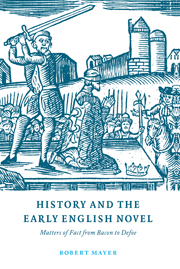Book contents
- Frontmatter
- Contents
- List of illustrations
- Acknowledgments
- Introduction
- 1 Baconian historiography: the contours of historical discourse in seventeenth-century England
- 2 “Idle Trash” or “Reliques of Somthing True”?: the fate of Brut and Arthur and the power of tradition
- 3 The History of Myddle: memory, history, and power
- 4 Lifewriting and historiography, fiction and fact: Baxter, Clarendon, and Hutchinson on the English Civil War
- 5 The secret history of the last Stuart kings
- 6 “Knowing strange things”: historical discourse in the century before Robinson Crusoe
- 7 “History” before Defoe: Nashe, Deloney, Behn, Manley
- 8 Defoe's historical practice: from “The Ages Humble Servant” to Major Alexander Ramkins
- 9 “Facts that are form'd to touch the mind”: Defoe's narratives as forms of historical discourse
- 10 From history to the novel: the reception of Defoe
- Conclusion
- Index
- CAMBRIDGE STUDIES IN EIGHTEENTH-CENTURY ENGLISH LITERATURE AND THOUGHT
Introduction
Published online by Cambridge University Press: 31 October 2009
- Frontmatter
- Contents
- List of illustrations
- Acknowledgments
- Introduction
- 1 Baconian historiography: the contours of historical discourse in seventeenth-century England
- 2 “Idle Trash” or “Reliques of Somthing True”?: the fate of Brut and Arthur and the power of tradition
- 3 The History of Myddle: memory, history, and power
- 4 Lifewriting and historiography, fiction and fact: Baxter, Clarendon, and Hutchinson on the English Civil War
- 5 The secret history of the last Stuart kings
- 6 “Knowing strange things”: historical discourse in the century before Robinson Crusoe
- 7 “History” before Defoe: Nashe, Deloney, Behn, Manley
- 8 Defoe's historical practice: from “The Ages Humble Servant” to Major Alexander Ramkins
- 9 “Facts that are form'd to touch the mind”: Defoe's narratives as forms of historical discourse
- 10 From history to the novel: the reception of Defoe
- Conclusion
- Index
- CAMBRIDGE STUDIES IN EIGHTEENTH-CENTURY ENGLISH LITERATURE AND THOUGHT
Summary
For a book that is a central text of Western civilization, Robinson Crusoe had a strange early history. In the first edition (1719), the title page announced that the work had been written by Crusoe, and the editor's preface asserted that the book was “a just History of Fact” even as it obscurely acknowledged that some or all of the narrative might be fictitious. A number of the early readers of Crusoe read the narrative as a factual account; Charles Gildon's famous attack on the book was rooted in his belief that many readers had been deceived by Defoe. Thus, Gildon's “D–1” tells Friday:
I did not make you speak broken English, to represent you as a Blockhead … but meerly for the Variety of Stile, to intermix some broken English to make my Lie go down the more glibly with the Vulgar Reader.
Having been branded a liar by Gildon, Defoe offered two defenses of his text and his method. The preface to The Farther Adventures of Robinson Crusoe (1719) observes that all efforts to “reproach” the earlier work “with being a romance … have proved abortive” and further argues that the “just Application” of the work “must legitimate the Part that may be call'd Invention”; the clear implication is that although some of the work might be invented, the account is essentially factual, “Contradictions in the Fact” having never been isolated. The preface to the Serious Reflections of Robinson Crusoe (1720) also rejects the claims of the “ill-disposed Part of the World … That … the Story is feign'd” and counters “that the Story, though Allegorical, is also Historical.”
- Type
- Chapter
- Information
- History and the Early English NovelMatters of Fact from Bacon to Defoe, pp. 1 - 17Publisher: Cambridge University PressPrint publication year: 1997

